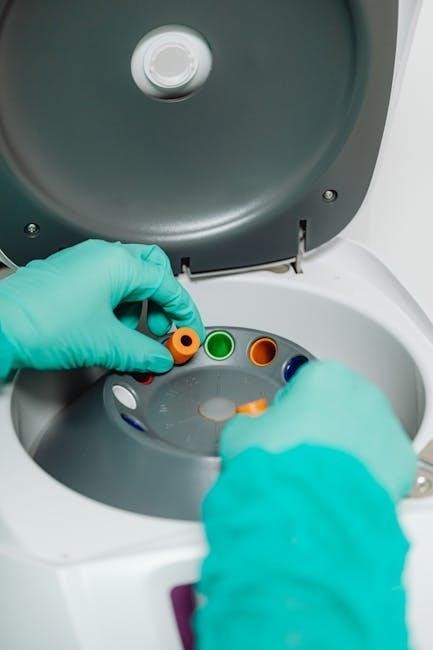The NJS LA Test Coordinator Manual 2024 provides essential guidance for managing test administration, ensuring compliance with state standards and procedures. It outlines roles, responsibilities, and best practices for a smooth testing process.
1.1 Overview
The NJS LA Test Coordinator Manual 2024 serves as a comprehensive guide for test coordinators to effectively manage and administer the New Jersey Student Learning Assessments. It provides detailed instructions, timelines, and resources to ensure a smooth testing process. The manual is structured to address both computer-based and paper-based test administrations, offering tailored guidance for each format. Key components include pre-test preparations, test security protocols, accommodations for special needs, and post-test procedures. Test coordinators will find step-by-step instructions, best practices, and compliance requirements to support their roles. The manual emphasizes the importance of organization, communication, and adherence to state and federal guidelines. By following this guide, coordinators can ensure a fair, secure, and efficient testing environment for all students. The document is designed to be user-friendly, with clear sections and references to assist in navigating the complexities of test administration.
1.2 Importance
The NJS LA Test Coordinator Manual 2024 is a critical resource for ensuring the integrity, fairness, and efficiency of the New Jersey Student Learning Assessments. It provides test coordinators with the necessary tools and knowledge to manage all aspects of test administration, from preparation to completion. The manual’s guidelines are essential for maintaining compliance with state and federal testing requirements, as well as for upholding the security and confidentiality of the assessments. By adhering to the manual, coordinators can ensure that all students have an equitable testing experience, regardless of their background or abilities. The manual also serves as a central reference point for resolving questions or concerns that may arise during the testing process. Its importance lies in its ability to support educators in administering assessments that accurately measure student learning and progress, ultimately contributing to informed decision-making for schools and districts.
1.3 Key Features
The 2024 NJS LA Test Coordinator Manual features comprehensive guidelines tailored to ensure effective test administration. It includes detailed sections on roles and responsibilities, pre-test preparations, and post-test procedures. The manual emphasizes test security protocols and offers strategies for accommodating students with special needs. It also provides technical requirements for digital testing environments and troubleshooting tips. Clear timelines for scheduling and materials management are outlined, ensuring coordinators can plan efficiently. The document includes sample forms and templates to streamline administrative tasks. Additionally, it offers resources for training and support, ensuring test coordinators are well-prepared. The manual is structured to address both computer-based and paper-based testing formats, making it a versatile tool for all test administration scenarios. Its clear and concise language ensures that all instructions are easily understood and implemented, supporting a seamless testing experience across New Jersey schools.

Roles and Responsibilities of a Test Coordinator
The Test Coordinator ensures smooth test administration by overseeing pre-test preparations, managing materials, and maintaining security. They coordinate schedules, communicate updates, and address testing concerns promptly and efficiently.
2.1 Pre-Test Responsibilities
The Test Coordinator plays a crucial role in ensuring the test administration process runs smoothly. Key pre-test responsibilities include scheduling test sessions, managing test materials, and registering students. They must verify the accuracy of student data and ensure all necessary accommodations are in place. Communicating updates and instructions to staff and students is essential. The Test Coordinator also trains proctors and staff on test procedures, ensuring compliance with state guidelines. They must conduct a walkthrough of test locations to confirm readiness and address any logistical issues. Additionally, they review and distribute test materials, ensuring security and confidentiality. Proper preparation and attention to detail are vital to avoid disruptions and ensure a fair testing environment for all students.
2.2 During Test Administration
During test administration, the Test Coordinator ensures a secure, fair, and orderly environment. Key duties include monitoring test sessions to prevent irregularities and addressing any issues promptly. They verify that all test materials are properly distributed and that students have no unauthorized resources. The Test Coordinator also ensures accurate time management and maintains a quiet, distraction-free setting. They are responsible for handling technical issues, such as connectivity problems, and resolving student concerns without disrupting the process. Additionally, they observe testing rooms to ensure compliance with test protocols and confidentiality. Effective communication with proctors and staff is crucial to maintain the integrity of the test. The Test Coordinator must remain vigilant to uphold the professionalism and fairness of the testing process, ensuring all students have an equal opportunity to perform their best.
2.3 Post-Test Duties
Following test administration, the Test Coordinator must ensure all materials are collected and accounted for, including used and unused test booklets. They verify the submission of completed tests and materials to the designated authorities. The Test Coordinator also reviews data for accuracy and completeness, addressing any discrepancies. Additionally, they provide feedback to school administrators on the testing process and identify areas for improvement. Post-test duties include documenting any irregularities or incidents and submitting formal reports. The Test Coordinator also ensures proper storage or secure disposal of test materials. Communication with stakeholders, such as parents or students, may be required to address concerns or provide updates. Finally, they prepare for the submission of test data, ensuring compliance with state and federal regulations. These tasks ensure the integrity and confidentiality of the testing process are maintained.

Preparing for Test Administration
Preparing for test administration involves scheduling, materials management, and student registration. Coordinators ensure all logistics are organized, and staff are trained to facilitate a smooth testing process.
3.1 Scheduling
Scheduling is a critical step in preparing for test administration. Coordinators must create a detailed testing timeline, ensuring all sessions align with school calendars and state deadlines. Proper time allocation for each test section is essential to avoid student fatigue. Additionally, coordinators should coordinate with school staff to reserve testing rooms and ensure minimal disruptions to regular classes. Training sessions for proctors and testers should also be scheduled in advance. Accurate scheduling ensures smooth test administration, allowing students and staff to prepare adequately. Clear communication of the schedule to all stakeholders is vital for transparency and organization. By adhering to these steps, coordinators can establish a well-organized testing environment.
3.2 Materials Management
Materials management involves organizing and distributing test resources efficiently. Coordinators must ensure all testing materials, such as answer sheets, question booklets, and instructions, are accounted for and accessible. Proper labeling and storage of materials prevent mix-ups and ensure security. Digital materials require secure access and compatible devices, with backup plans for technical issues. Coordinators must also manage inventory, track usage, and return unused materials promptly. Clear communication with school staff and test administrators is crucial to ensure all materials are correctly distributed and accounted for. Effective materials management minimizes delays and ensures a smooth testing process, maintaining the integrity and security of the assessment.
3.3 Student Registration
Student registration is a critical step in preparing for test administration. Coordinators must ensure all eligible students are accurately registered, with correct demographic and program participation details. This includes verifying student information, such as names, grades, and special accommodations, to prevent errors. Coordinators should use provided registration tools and follow state guidelines to submit data timely. Accurate registration guarantees that students receive appropriate test materials and accommodations, ensuring fairness and accessibility. Regular communication with school staff and parents helps identify and resolve registration issues promptly. Proper documentation and record-keeping are essential for tracking student participation and addressing any discrepancies. Effective student registration streamlines the testing process, ensuring all students are prepared and accounted for on test day.
Test Administration Procedures
Test administration procedures ensure a standardized and secure testing environment. Coordinators must follow startup protocols, monitor testing sessions, and handle irregularities promptly to maintain test integrity and student focus.
4.1 Startup
The startup phase ensures a smooth transition into test administration. Begin by conducting system checks to verify all devices are functional and connected. Distribute test materials securely, ensuring each student receives the correct version. Verify student identities and confirm eligibility. Review technical setups, such as login credentials and browser configurations. Provide clear instructions and address any pre-test questions. Conduct a brief orientation to familiarize students with the test format and tools. Ensure timing and settings are accurate before initiating the test. Monitor the environment to maintain a quiet, focused atmosphere. Address any technical issues promptly to prevent delays. Document any anomalies for post-test review. Once all preparations are complete, instruct students to begin the test, ensuring adherence to all protocols. This structured approach minimizes disruptions and supports a fair testing experience for all participants.
4.2 During Testing
During testing, the Test Coordinator must actively monitor the environment to ensure compliance with protocols. Begin by verifying that all students are logged in correctly and that no unauthorized materials are present. Circulate the room to monitor student activity and address any technical issues promptly. Ensure strict adherence to time limits and test security. Handle any irregularities, such as technical glitches or student misconduct, according to established procedures. Provide support to students without influencing their responses. Maintain a quiet and focused atmosphere, intervening if distractions arise. Document any incidents or deviations from the testing protocol. Ensure all students complete the test within the allotted time and submit their responses securely. Post-test, verify that all materials are collected and stored properly to maintain confidentiality. This phase requires attention to detail and proactive management to ensure a fair and secure testing experience for all participants.
4.3 Handling Irregularities
Handling irregularities during test administration requires prompt and documented action. Identify and address any deviations from standard procedures, such as technical issues, improper test materials, or student misconduct. Ensure all incidents are logged with detailed descriptions, including the nature of the issue, affected students, and resolution steps taken. Communicate immediately with school administrators or the testing office for guidance, especially for severe or unresolved issues. Maintain test security by securing affected materials and preventing unauthorized access. Provide support to impacted students while avoiding any actions that could compromise test integrity. Follow established protocols for reporting and documenting irregularities to ensure compliance with state and federal guidelines. Post-incident, review procedures to prevent future occurrences and ensure fairness for all participants. Proper documentation and timely communication are critical to managing irregularities effectively and maintaining the validity of the testing process.

Ensuring Test Security and Confidentiality
Ensuring test security and confidentiality requires strict adherence to protocols, secure storage of materials, and limited access to authorized personnel only. Maintain confidentiality throughout all test administration processes.
5.1 Protocols
Protocols for ensuring test security and confidentiality are critical to maintaining the integrity of the NJS LA testing process. Test coordinators must follow strict guidelines to prevent unauthorized access to test materials. This includes secure storage of physical and digital materials, with limited access granted only to authorized personnel. All staff involved in test administration must sign confidentiality agreements prior to handling test materials.
Additional protocols involve verifying the identity of individuals accessing test materials and ensuring that all test sessions are monitored. Electronic materials should be encrypted, and digital platforms must comply with data protection standards. Breaches of security or confidentiality must be reported immediately, with detailed documentation of incidents. Adhering to these protocols ensures the validity and fairness of the testing process for all students.
5.2 Monitoring
Monitoring during test administration is essential to ensure the integrity and security of the NJS LA assessments. Test coordinators and proctors must actively supervise students to prevent unauthorized activities, such as cheating or use of prohibited materials. This includes maintaining a secure testing environment, verifying student identities, and ensuring all devices are test-ready.
Continuous observation is required to address any irregularities promptly. Coordinators should circulate throughout the testing area to monitor student behavior and ensure compliance with test rules. Technical monitoring involves checking for connectivity issues and ensuring all software functions correctly. Any disruptions or suspicious activities must be documented and reported.
Proactive monitoring helps maintain a fair and equitable testing experience for all students, upholding the validity of the assessment process.
5.3 Incident Reporting
Incident reporting is a critical component of ensuring test security and integrity. Test coordinators must document any irregularities or incidents during test administration, such as cheating, unauthorized materials, or technical issues. Detailed records should include the nature of the incident, affected students, and actions taken to resolve it.
Coordinators must notify the appropriate authorities promptly, following established protocols. This ensures that incidents are addressed fairly and consistently. Failure to report incidents may result in delayed or invalidated test results, as well as potential penalties for non-compliance with state guidelines.
Accurate and timely reporting upholds the validity of the assessment process and maintains fairness for all students. Proper documentation also supports post-test reviews and improvements for future administrations.

Accommodations for Special Needs
This section outlines accommodations for students with special needs, ensuring equal access during NJS LA testing. It includes extended time, scribe support, Braille materials, and other approved adjustments to comply with accessibility standards.
6.1 Types
This section details the various types of accommodations available for students with special needs during NJS LA testing. These include:
- Time Accommodations: Extended time, flexible scheduling, or untimed tests to ensure students can complete tasks without undue stress.
- Presentation Accommodations: Materials in Braille, large print, or electronic formats to meet visual or auditory needs.
- Response Accommodations: Use of scribes, speech-to-text software, or assistive devices to help students express answers effectively.
- Other Supports: Preferential seating, breaks between sections, or use of noise-canceling headphones to create a conducive environment.
Each accommodation is designed to address specific needs, ensuring equitable access for all students. Coordinators must verify eligibility and document approved accommodations in advance.
6.2 Implementation
Implementing accommodations requires careful planning and coordination to ensure students receive the support they need. Test coordinators must verify eligibility and assign approved accommodations, communicating them to test administrators. Materials and settings should be prepared in advance to meet specific requirements, such as Braille texts or assistive technologies. Coordinators must ensure accommodations are applied consistently across all test sessions and that confidentiality is maintained. Training staff on accommodation procedures is crucial to avoid errors. During testing, monitors should observe and address any issues promptly. Coordinators are responsible for documenting the implementation of accommodations and reporting any challenges or irregularities. Effective implementation ensures fairness and accessibility, allowing students with special needs to demonstrate their knowledge and skills accurately.
6.3 Documentation
Documentation is critical for ensuring accountability and compliance with testing accommodations. Test coordinators must maintain detailed records of all accommodations provided, including the type, implementation, and any supporting documentation. This includes Individualized Education Programs (IEPs) or 504 plans, accommodation approval forms, and test administration logs. All records should be stored securely to protect student confidentiality. Accurate documentation helps verify that accommodations were delivered as intended and provides a reference for resolving disputes or irregularities. Coordinators must also document any deviations from planned accommodations and the rationale behind them. Proper documentation ensures transparency, supports data-driven decision-making, and demonstrates adherence to state and federal regulations. It also serves as a resource for future test administrations, helping to refine accommodation practices and improve outcomes for students with special needs.

Technical Requirements and Setup
The NJS LA Test Coordinator Manual 2024 outlines the necessary technical specifications and setup procedures to ensure smooth test administration, including hardware, software, and network requirements.
7.1 Hardware
The NJS LA Test Coordinator Manual 2024 specifies the hardware requirements for test administration, ensuring compatibility with the testing platform. Computers or tablets must meet minimum specifications, including a supported operating system, sufficient RAM, and compatible browsers; Additionally, devices must have functional audio capabilities for audio-based questions. The manual emphasizes the importance of verifying hardware compatibility before test administration to prevent technical issues. Test coordinators are advised to ensure all devices are updated with the latest software patches and security updates. External peripherals, such as keyboards and mice, should be tested in advance. For proctored testing environments, secure and stable network connections are mandatory. The manual also recommends having backup devices or systems in place to address any unexpected hardware failures during testing sessions.
7.2 Software
The NJS LA Test Coordinator Manual 2024 outlines specific software requirements to ensure seamless test administration. Devices must run supported operating systems and have compatible browsers installed, such as Chrome or Firefox. Additionally, the manual emphasizes the importance of installing the latest security patches and updates to maintain system integrity. Test coordinators must ensure that all necessary plugins and extensions are enabled to support interactive test features. The manual recommends using the official testing platform provided by the state, which includes tools for accommodations and accessibility. Regular software audits are advised to confirm compliance with technical specifications. It is crucial to test all software configurations in advance to identify and resolve potential issues before the test administration begins. Properly configured software ensures a smooth and secure testing environment for all students.
7.3 Troubleshooting
Troubleshooting is a critical component of ensuring a smooth testing experience. The manual provides detailed steps to address common technical issues, such as connectivity problems, login errors, and device malfunctions. Test coordinators should first verify network stability and server availability before escalating issues. For hardware-related problems, restarting devices or swapping out malfunctioning equipment is often recommended. Software issues may require checking for updates or reinstalling testing applications. The manual also emphasizes the importance of documenting all troubleshooting efforts for future reference. Coordinators are advised to work closely with IT support and the test vendor’s help desk to resolve complex issues promptly. Regular system checks and backups are recommended to prevent data loss. By following these guidelines, coordinators can minimize disruptions and ensure a successful testing environment. Proactive troubleshooting is essential for maintaining test integrity and participant confidence.

Post-Test Procedures and Data Submission
Post-test procedures involve securely collecting materials, submitting data accurately, and verifying results. Timely submission ensures compliance with state requirements and maintains test integrity for valid outcomes and reporting.
8.1 Collection
After test administration, the test coordinator must ensure all materials are collected systematically. This includes answer sheets, unused test booklets, and any additional resources provided to students. Proper organization and security are critical to maintain test integrity and accountability. Coordinators should verify that all materials are accounted for and stored securely to prevent unauthorized access. Any irregularities or discrepancies during collection must be documented and reported immediately. This step ensures that all necessary data is preserved for accurate submission and analysis. Following state guidelines and protocols is essential to avoid potential issues during the submission process. Timely and efficient collection practices help streamline subsequent steps, such as data verification and reporting. Proper documentation of the collection process is also required to ensure compliance with testing regulations and procedures outlined in the manual.
8.2 Submission
The submission process involves sending all collected test materials and data to the designated authorities. Timely and accurate submission is crucial for maintaining the integrity of the testing program. Test coordinators must ensure that all materials, including answer sheets and test booklets, are properly organized and securely packaged. Electronic submissions, such as uploading data through designated portals, must adhere to strict security protocols to protect student information. Coordinators should verify that all submissions are complete and meet formatting requirements before finalizing. Late or incomplete submissions may result in delays or penalties. Following submission, coordinators should retain copies of confirmation receipts and documentation for records. This step ensures that all data is successfully transmitted and ready for further processing and analysis.
8.3 Verification
Verification is a critical step to ensure the accuracy and completeness of submitted test data. Test coordinators must review all materials and documentation to confirm that they align with state guidelines. This includes checking student rosters, ensuring all test materials are accounted for, and verifying that electronic data submissions are free from errors. Coordinators should also cross-reference submission receipts with inventories to prevent discrepancies. Any inconsistencies or issues identified during verification must be promptly addressed and documented. This step ensures that the data submitted is valid and ready for official processing. Verification not only maintains the integrity of the testing process but also supports the accurate assessment of student performance. By meticulously reviewing all aspects, coordinators play a key role in upholding the reliability and fairness of the NJS LA testing program.
